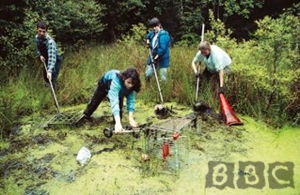The BBC: as transparent as a dirty pond

The BBC won’t tell us what’s in the pond so let’s take a closer look at that shopping trolley.
I’ve made quite a few attempts recently to get information out of the BBC. It has generally been a frustrating experience, which it shouldn’t be when you consider that the BBC are publicly funded and are therefore subject to the Freedom of Information Act 2000, and that one of the challenges set for them by the BBC Trust is to “set new standards of openness and transparency”. You might also think that after all the recent revelations of child abuse by BBC employees, not to mention deeply flawed journalist work on Newsnight, that they would be really keen to open their hearts and minds and answer questions from the public on any topic. But no.
The metaphor that came to mind to describe the BBC’s ‘transparency’ was ‘a dirty pond’. One so dirty that you cannot see what is happening in the water. Don’t worry, this isn’t leading to puns about the BBC being fishy. It does however lead to a strategy with which to challenge the opaque BBC. Just like a dirty pond, you can build up a picture about what goes on beneath the surface at the BBC by analysing what floats up to the surface. Or as the BBC prefer to call it, “their output”. This is not a new idea of course – people have been demonstrating how the BBC routinely omits news stories and other content that doesn’t support the establishment or the mainstream patriarchal view for some time. But it’s an idea I’m going to run with in future posts.
I’ll leave you with two examples of BBC opaqueness:
1. Anyone who has ever FOI’d the BBC will be painfully familiar with “Part VI of Schedule 1 to FOI Act” which “provides that information held by the BBC and the other public service broadcasters is only covered by the Act if it is held for ‘purposes other than those of journalism, art or literature’” The BBC loves this exemption and has spent the equivalent of thousands of license fees defending challenges to it in court… But while expensive lawyers can prove the legal argument, is it ethically defensible to use that exemption to avoid answering questions like this:
How do you ensure that the “extensive network of correspondents around the globe and trusted press agencies” who “alert newsroom editors to news developments” are operating free from bias…?
Shouldn’t the BBC be keen to display the processes it has in place to make sure its output is bias free?
2. The BBC, unlike many other public sector organisations, spurns the “citizen journalist”. Approach their press office with a well-drafted, polite question, as a member of the public working on a CJ basis and they will ignore you. A certain irony in that I thought. Especially as many journalists fire ill thought out questions at public services as part of ‘story-gathering’ – questions they never use the answer to and which therefore waste public money in the asking.
Now, let’s have a good look at that shopping trolley.
I think the BBC is biased toward the Government ..anyone thinking it to be a “lefty” organisation ,is in my opinion slightly to the right of Genghis Khan..
An area I’d like to know more about is: how do they select the journalists who cover foreign countries? Are language skills crucial? How is knowledge of the local culture assessed? A few years ago, I remember the Paris correspondent (sorry, I can’t remember his name) being asked whether he spoke French fluently when he took the job. His reply was: “I do now.” Which of course suggests that he brushed up his French on the job. I also remember when some Leicester City footballers were accused (falsely) of rape in Spain. The BBC journalist couldn’t speak Spanish and was dependent on Spanish journalists telling her in English what was happening. We have one of the most diverse cultures in the world, with people who speak the language and know the culture of most countries in the world. However, when something occurs in India or China, almost always there is a white person, probably private school and Oxbridge, covering the event. Skin colour is of course notin itself the issue. The issue is that that person does not speak the local language and does not have any real knowledge of the country.
When John Simpson was recently on BBC fivelive, he announced his ‘sneaking kind of liking’ for Saddam Hussein. I find it alarming that a senior BBC correspondent should find a mass murderer attractive and it possibly suggests that John misses having a tyranny to go with his own egomania.